China Society
Beyond Climate Change Concerns: Fukushima Fear and Eco-Anxiety in China
“Is our world turning into an apocalyptic survival game?” Fears over Fukushima waste water and other global threats are fueling public anxiety in China.
Published
11 months agoon
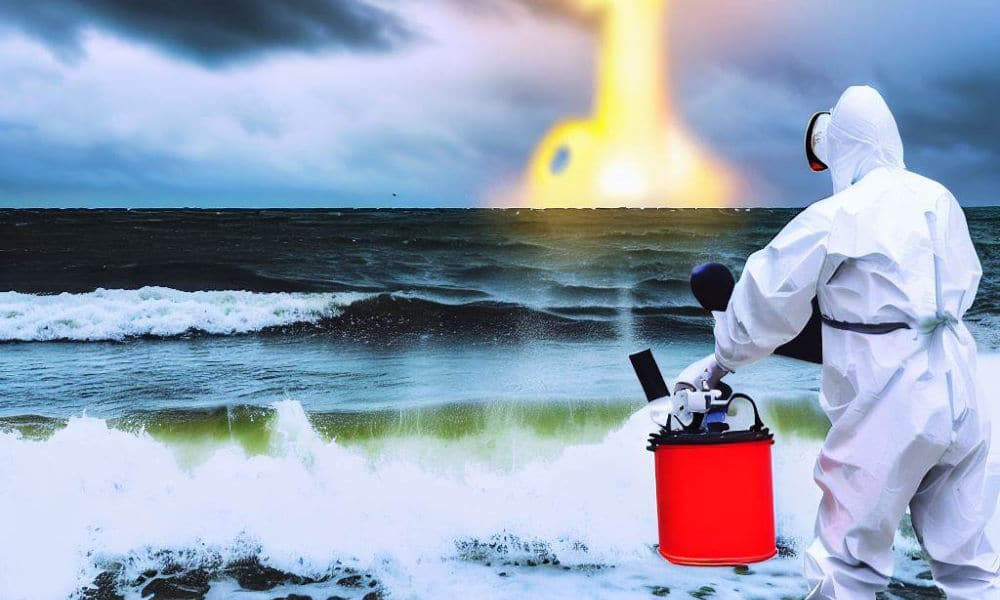
While there isn’t a heated ongoing debate about global warming and climate change in China, it doesn’t imply that people are apathetic about the environment and well-being of future generations. Public expressions of ‘eco-anxiety’ and fears for the future are channeled towards different topics in China, where some believe that recent global challenges have transformed their lives into an ‘apocalyptic survival game.’
Over the past ten days, Japan’s decision to release treated nuclear water has ignited waves of anger and concern on Chinese social media platforms. Many netizens express worries about how the Fukushima wastewater might impact the marine ecosystem, while others are deeply concerned about the long-term repercussions of this pollution on their food safety and overall well-being in the coming decades.
The huge public concern over the Fukushima water seemingly poses a stark contrast with that over climate change. As Miranda Barnes recently noted in our Weibo Watch newsletter, the urgent implications of climate change and global warming caused by human activities are a huge topic of debate in Western countries, especially in relation to extreme weather. In China however, the phenomenon of “eco-anxiety” doesn’t resonate among the public in the same manner as it does in Western discourse, despite notable events like China recording historically high temperatures in July, the impact of Typhoon Doksuri, last summer’s wildfires and this summer’s devastating floods.
In a recent Reuters article about the discussions surrounding climate change in China, a Greenpeace senior adviser called it a “big missed opportunity” that Chinese state media and official channels did not connect the recent extreme weather in the country to its own carbon emissions and climate change at large.
China’s limited engagement with the climate change discourse is also noticeable in the realm of social media. Researchers Chuxuan Liu and Jeremy Lee Wallace published a study about “China’s missing climate change debate” (2023), concluding that social media site Weibo does not have very active discussions about the topic of climate change at all. They found that only 0.12% of the unique trending topics on Weibo from June 2017 to February 2021 were related to this theme.
Some news articles suggest that the lack of climate crisis discussions in China relates to the challenges faced by grass-roots environmental movements in contemporary China, alongside censorship.
But climate anxiety is not the only form of eco-anxiety, and it would be a misconception to assume that absence of panic over climate issues means that Chinese people are not concerned about the environment or the well-being of future generations at all. As explained in Eco-Anxiety and Pandemic Distress, various global threats, including climate change, ecological challenges, and pandemics, are interconnected in multiple ways. Pandemics can influence ecological problems, for example, and ecological dynamics and climate factors can also cause outbreaks and shape pandemics (Pihkala 2023, 1).
Climate change, global warming, and environmental activism may not hold as prominent a place in daily social life and online media in China as in the West, but some topics related to global ecological challenges — often communicated by state media and amplified by public responses — actually garner more engagement than in Western countries.
We delve into a few examples in this article. Given the scope of our discussion, we won’t go into the scientific details behind these phenomena; instead, we’ll center our attention on the public anxiety surrounding them.
Public Panic over Fukushima
Japan’s decision to start discharging treated nuclear water into the Pacific has already become one of the biggest topics on Chinese social media this year. Through Weibo posts, short videos, articles, and memes, people vociferously criticized Japan for what they saw as an irresponsible act of releasing “contaminated water” (污染水) – a concept popularized by official channels highlighting the toxicity of the disposed water, as opposed to the more neutral “treated water” (废水) term.
In the first days surrounding the Fukushima waste water release, a trending topic on Chinese social media highlighted how the move would harm to the oceanic ecosystem, with many people posting photos of dolphins, sealions, whales, fish, and other wildlife that could be affected by water pollution alongside the hashtag “History Won’t Forget.”
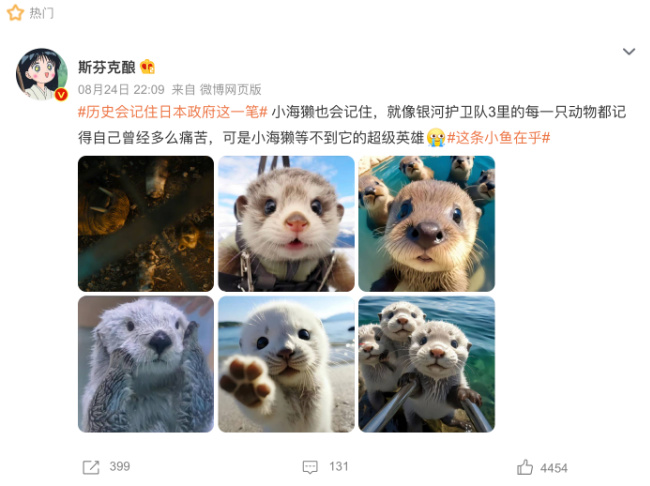
This post claimed that “the sea otters will also remember” what Japan has done.
In addition to a surge in anti-Japanese sentiments and concerns about the livelihoods of the Chinese fishing industry, another significant aspect of the viral online responses to the Fukushima wastewater issue has been the discussions regarding strategies for how to survive the perceived crisis.
While in the English-language media sphere, critics dismissed the panic as unwarranted, stressing that the disposal is well within safety limits or that environmental impact is negligible, the release of the treated water caused an outbreak of apocalyptic fears and many people immediately took action to protect themselves and their loved ones in various ways.
These fears are widespread, encompassing notions such as the contaminated water having the potential to induce mutations in marine life and elevate the risk of cancer when consumed by humans.
On the day preceding the wastewater release, Chinese state media outlet China Daily launched a hashtag about how “the nuclear-treated water will reach our seashore in 240 days” (#核废水排放后240天就会到达我国沿岸海域#). This statement was based on a Tsinghua University simulation study into how the tritium will spread.
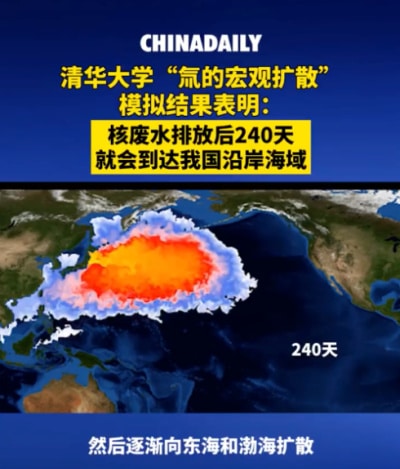
A screenshot from the video posted by the Weibo account of China Daily about the simulation study, showing that the water will reach China’s seashore after 240 days.
The idea that the contaminated water discharged into the Pacific could reach China within less than eight months quickly gained traction on social media platforms, with many netizens reposting and highlighting the timeline, even planning their “last activities” within these days, such as consuming China-produced seafood or visiting the beach.
Rumors suggesting that the released water would reach the United States long after affecting China and nearby countries also gained widespread online popularity. Some of these analyses led to suspicions that the release of treated water must be a joint conspiracy by Japan and the United States, with the specific aim of targeting the lives of Chinese people.
Guidelines on how everyday practices could mitigate radioactive harm widely circulated. These included recommendations such as taking showers after it rains, identifying makeup products free from radioactive elements, or transitioning to a more vegetarian-based diet. Many of these tips, however, have no scientific basis. One restaurant in Shanghai even started offering anti-radioactive menus.
Meanwhile people began hoarding supplies in preparation for long-term survival. In the coastal city of Weihai, the closest Chinese city to South Korea, four tons of salt were sold in just one hour as citizens queued to stockpile salt on August 24. The salt frenzy stems from collective concerns about the impact of Fukushima water on food safety and that table salt – in the near future and in the decades to come – might also become compromised. There’s also a believe that salt might help in case of radiation pollution (iodized salt, however, is actually no antidote for radiation).
Although muck of the panic buying may have evoked memories of the past Covid years and preparations for the potential next lockdown, people actually also started hoarding salt back in 2011 shortly after the nuclear accident at Fukushima Daiichi in March of that year.
Russia’s Anthrax Outbreak
Similar to the Fukushima wastewater responses, the same question of “how long does it take to arrive in China” also frequently pops up in the discussions surrounding the spread of anthrax in Russia. Anthrax is a serious infectious disease that occurs naturally in soil and can cause severe diseases to both humans and animals.
While Western media mostly focused on the Prigozhin jet crash incident, news of a mysterious anthrax outbreak in Russia (#俄罗斯一地暴发细菌性炭疽病#) has garnered attention on Chinese social media, causing significant concern. A current hypothesis directly connects climate change and the outbreak by suggesting that the thawing of frozen soil might have exposed people to decades-old infected reindeer carcasses.
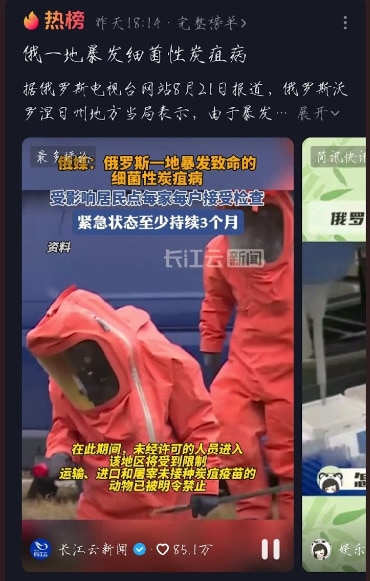
A screenshot of the search result on Wechat channels on the topic of Russia’s anthrax, which shows that one related videos received 851,000 likes. Image shared by a netizen on Weibo.
In the comments under reports about the anthrax outbreak, many people are curious about how close the outbreak is to China’s borders. Others are researching anthrax transmission and fatality rates, wondering if it could turn into another global pandemic.
While most people are concerned about the outbreak’s potential impact, some are politicizing it without clear evidence, accusing the US of engaging in new “biological warfare” in Russia.

An image of the game “Resident Evil: Death Island” from a game review article.
The unease about Russia’s anthrax outbreak possibly being linked to “biological warfare” aligns with the public’s anxiety about mutations caused by Japan’s release of radioactive water. These worries amplify existing concerns about environmental changes, drawing parallels with the dystopian world of the Japanese survival horror game “Resident Evil,” where players face environments filled with zombies and other terrifying creatures. In discussions about the anthrax situation, a recurring question emerges: “Why does our reality increasingly resemble an apocalyptic survival game?”
Covid-19 Subvariants and Monkeypox
Apocalyptic game survival always becomes challenging when there are more than two crises unfolding at the same time. Beyond the concerns about contaminated water and anthrax outbreaks, another issue has captured the attention of the Chinese public recently – the spread of the latest Covid-19 subvariants, EG.5 and BA.2.86.
EG.5 is now the most prevalent in the US and has been detected in at least 52 countries. BA.2.86 is much less widespread, but scientists are alarmed by how many mutations it carries.
While more Chinese social media users are sharing their own experiences of getting Covid a third time, people begin to worry about the possible impact of a massive Covid-19 third wave, referred to as sān yáng (三阳). At the same time, some accounts are giving daily updates on new global cases of BA.2.86, and news reports related to new Covid sub-variants ignite strong reactions from netizens.
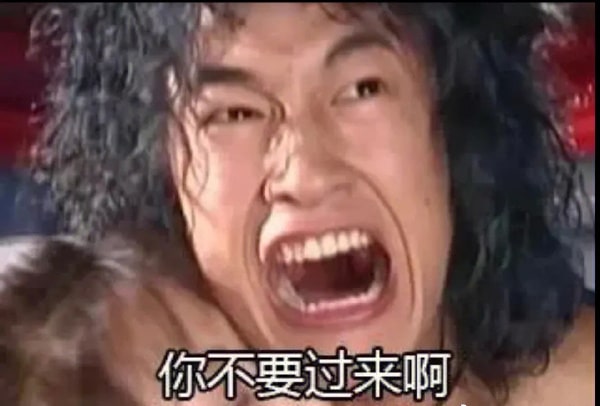
“Do not come over” meme used during the monkeypox outbreak.
We have seen similar responses related to news about monkeypox (mpox), with one domestic case of monkeypox occurring in July of this year becoming a top trending topic. Soon after, China saw the world’s fastest increase in cases of mpox, leading to significant concerns expressed by many, with people seeking information on preventive measures to avoid contracting the virus and expressing their hopes that the virus will remain far away from them.
Apocalyptic Games
“The main task is to stay alive”, concluded numerous netizens on Weibo after listing recent hashtags related to nuclear water, anthrax, and the next Covid-19 subvariant in their posts.
The combination of recent crises involving the environment and public health has made the prospect of impending catastrophe feel distressingly real to many. Half-jokingly, young people on Weibo express their concerns about having shorter lifespans. One netizen even humorously remarks, “Paying into your pension plan under these circumstances is almost like a form of romantic heroism,” suggesting that maintaining the belief that one will live long enough to enjoy their pension is overly optimistic and somewhat naive, especially in the face of present-day global challenges.
Beyond concerns about pension plans, a reluctance to have children has also emerged as a common sentiment, especially after Japan’s release of nuclear treated water. A viral screenshot of a street interview in Hong Kong captures the essence of this sentiment. In the interview, a young person nonchalantly responds that he isn’t worried about contamination of Japanese seafood because he doesn’t plan to have children. While not everyone shares this carefree attitude, many agree that having children in the current climate would be risky and senseless given the state of the world today.
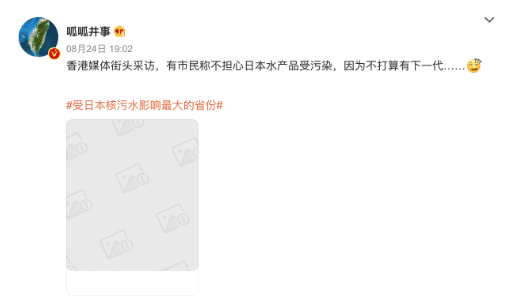
A Weibo user sharing the screenshot of the interview on Weibo and comment that “[This is from] a street interview in Hong Kong. Some citizens said they did not worry about the contamination of Japanese seafood because they did not plan to have children.” The screenshot has now been censored.
Some netizens humorously assume the roles of players in an apocalyptic survival game, assigning different tasks to themselves.
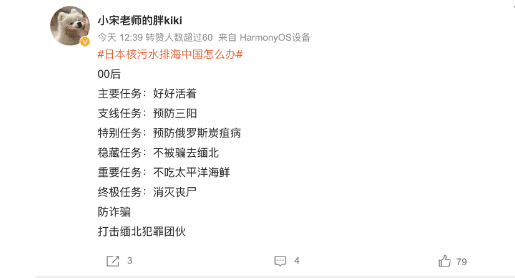
A Weibo user sharing their “tasks” in the survival game.
Under the hashtag ‘What China Can Do When Japan Releases Contaminated Water in the Ocean’ (#日本核污水排海中国怎么办#), one netizen outlines tasks for ‘players’ based on priorities: “Primary task: stay alive; Side-quest: prevent a third-time Covid-19 infection; Special Task: prevent Russia’s anthrax; Hidden task: avoid being deceived by North Myanmar; Important task: avoid consuming seafood from the Pacific Ocean; Final task: eliminate zombies.” Similar tasks have been listed in other posts, reflecting the sentiment that a mass extinction event is looming, making survival increasingly challenging.
Eco-Anxiety and a Bleak Future
While the term ‘eco-anxiety’ is familiar in Western societies and used by environmental activists, it has yet to become popular among the general public in mainland China, and there is no widely recognized Chinese translation for it. However, this doesn’t mean that only vocal activists are concerned about ecological disasters, or that ordinary people in China are indifferent to global challenges because their concerns are not framed in terms of climate change or expressed through activism.
As numerous studies have shown, ecological anxiety is not exclusive to the West. It’s just that the Western language and framework may have captured this mentality first, making it easy to overlook individuals in other regions who share the same sentiments but express them differently.
Certainly, as elsewhere, mainstream national media in China also contribute significantly to events and incidents that fuel “eco-anxiety” among the public. Moreover, changing political narratives play a pivotal role in shaping these dynamics.
In contrast to the West, Chinese media doesn’t necessarily connect global warming to the nation’s carbon emissions. A recent article published by The Economist discussed official and public discussions being “inward-looking” and avoiding direct engagement with climate change debates.
However, as recently pointed out by Miranda Barnes in our newsletter, additional factors contribute to the distinct responses of Chinese netizens, particularly regarding personal consumption and how individual behavior is connected to climate change. With many people, especially elderly, feeling they bear no responsibility for major pollution or gas emissions, “extreme weather” (“极端天气”) topics on on Chinese social media mostly center around personal safety, self-rescue strategies, and considerations for insurance rather than the collective responsibility of humanity for causing climate change.
Complicating matters further, the presence of low social trust and public skepticism towards official media exacerbates eco-anxiety and other concerns about well-being and the future. People often believe that prioritizing individual self-help and self-protection is the safer option, leading to behaviors like panic buying, even when official sources advise against hoarding.
It is also noteworthy that many of the topics that people are concerned about when it comes to eco-anxiety and public health scares are linked, either directly or indirectly, to foreign countries. While several socio-historical factors contribute to these fears, there are critics who argue that Chinese leaders might exploit public sentiment against Japan or the US to deflect attention from their own internal economic, ecological, and political challenges. On the other hand, some Chinese commentators interpret the Western world’s apparent indifference to these issues as a prioritization of political strategies and capitalist profits over ecological concerns.

A cartoon posted on Weibo showing the US creating a samurai sword for Japan to fight with, mocking the US’s supportive attitude in Japan’s release of treated water.
Eco-anxiety is a collective response to various interconnected issues, including pandemics, disease spread, food security, environmental disasters, and the well-being of future generations. It’s like a complex puzzle where many pieces are intertwined, often involving intricate geopolitical and domestic political dimensions.
After the recent Fukushima fears, one person wrote on Weibo: “A while ago when listening to the BBC, I first heard the English term ‘eco-anxiety’ and I originally did not understand at all, why would people suffer from ‘eco-anxiety’? I hadn’t seen anyone around me with such emotions. But I get it now. I’m already deeply anxious myself.”
By Zilan Qian and Manya Koetse, with contributions by Miranda Barnes
Follow @whatsonweibo
References:
Liu, Chuxuan and Jeremy Wallace. 2023. “What’s Not Trending on Weibo: China’s Missing Climate Change Discourse.” Environmental Research Communications 5 (1).
Pihkala, Panu. 2023. “Introduction” In: Eco-Anxiety and Pandemic Distress. Edited by: Douglas A. Vakoch and Sam Mickey, Oxford University Press.
Get the story behind the hashtag. Subscribe to What’s on Weibo here to receive our newsletter and get access to our latest articles:
Spotted a mistake or want to add something? Please let us know in comments below or email us. First-time commenters, please be patient – we will have to manually approve your comment before it appears.
©2023 Whatsonweibo. All rights reserved. Do not reproduce our content without permission – you can contact us at info@whatsonweibo.com.
Stories that are authored by the What's on Weibo Team are the stories that multiple authors contributed to. Please check the names at the end of the articles to see who the authors are.

Also Read
China Memes & Viral
Weibo Watch: Get Up, Stand Up
This week, Chinese netizens discussed subway seat confrontations, a shocking public stabbing, and Hu Youping’s heroism. Also: more trending topics, from hallucinogenic mushrooms to traveling pandas and reactions to the Biden vs. Trump debate.
Published
3 weeks agoon
July 7, 2024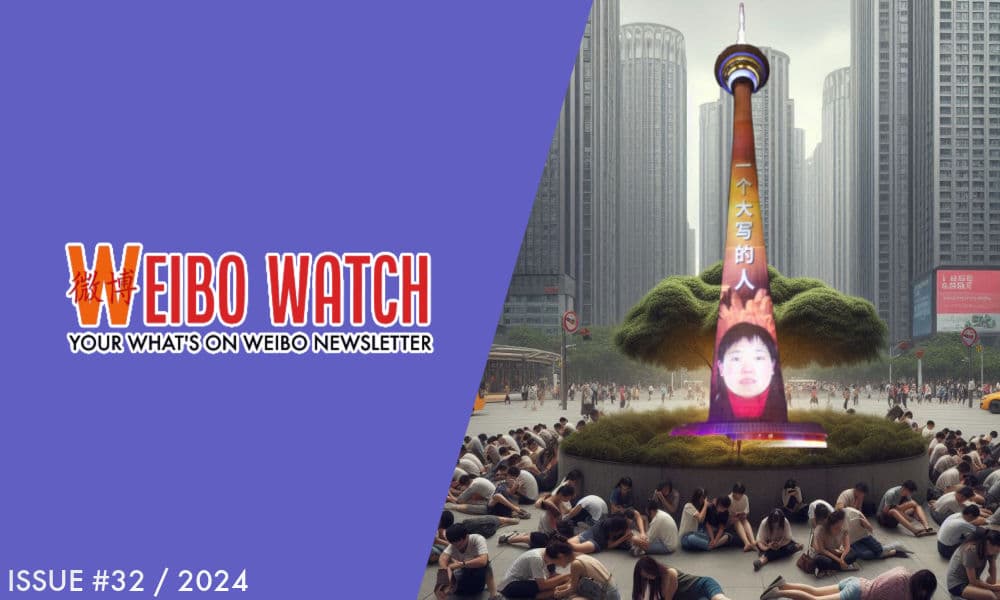
PREMIUM NEWSLETTER | ISSUE #32
This week’s newsletter:
◼︎ 1. Editor’s Note – Get up, stand up
◼︎ 2. What’s New and Noteworthy – A closer look at the featured stories
◼︎ 3. What’s Trending – Hot highlights
◼︎ 4. What’s Remarkable – Seeing little people
◼︎ 6. What’s Popular – Wild Child: missing in action
◼︎ 7. What’s Memorable – Bystander effect
◼︎ 8. Weibo Word of the Week – “City bu City”
Dear Reader,
Over the past few weeks, there has been a lot of discussion on Chinese social media about young people refusing to give up their seats for older people on the subway, sometimes leading to explosive situations.
On June 16, security was called when a young man on a Shenyang subway crumbled after an old man demanded that he’d give up his seat for him. In a video of the incident, which soon went viral, the young man can be heard screaming: “Are you giving me money? No? Then don’t bother me! I’m just happy to be sitting here. What’s wrong with me grabbing a seat?
Another subway incident went trending a week later. On June 24, a 65-year-old man started harassing a young woman on Beijing Subway Line 10 after she refused to give up his seat to him. The man became aggressive, started slapping the woman and put his cane in between her legs, trying to force her to stand up. The incident, which was filmed by other passengers, caused outrage on social media and the man was later detained by Beijing police.
A day later, in Wuhan, an elderly man and a young woman also got into an altercation that was caught on camera. After female passenger took the only available seat during morning rush hour on Line 2, the man reminded her that she should give up her seat out of respect for the elderly. “Why should I?” she asked: “I don’t owe you anything. I work overtime until 12:00 at night every day, and now you expect me to give up my seat during the morning rush hour?”
These incidents have sparked discussions about how people feel about these situations. In China, where respect for the elderly is deeply ingrained in the culture, should you give up your seat to the elderly on public transport because it is your duty, or is it just a personal choice? In an online poll held by Sina News, over 93% of respondents said they felt it was not their duty to give up their seat but a personal choice—a matter of courtesy.
“As long as you’re not sitting in a priority seat, you don’t have to give up your seat,” a top comment said. “It’s not easy being working class.” Many people echoed this sentiment, siding with the younger people who are facing their own tough struggles in China today. “I’d advise the elderly not to crowd public transport during the morning and evening rush hour,” another popular comment said, receiving thousands of likes.
These discussions signal a social shift: “When the topic comes up about young people not giving up their seats for the elderly, have you ever considered that these young people have been working all day? If you feel so strongly about it being your duty, how about you call a taxi for the elderly yourself?”
While many commenters expressed that people are not obliged to give up their seats to others, some, including pregnant women, complained about the overall reluctance of other passengers to give up their seats for them. “It feels like everybody is tired,” one Weibo user wrote.
Standing By
Another noteworthy discussion on Chinese social media recently was not about sitting down but about standing by. In a stabbing incident caught on camera by bystanders, a man locally known as “Bag-Clutching Brother” (夹包哥) was killed in the city of Songyuan in China’s Jilin province on June 30. His real name was Mr. Zhao, but he earned the nickname “Jiabaoge” (夹包哥, “Brother Clutch Bag”) for his eccentric square dancing while clutching a bag.
A video of the horrific incident shows Mr. Zhao happily dancing in a public square in Songyuan, with dozens of people present, when a man suddenly draws a knife and starts stabbing him. As the crowd watches on, the attack continues. Moments later, Mr. Zhao can be seen lying in a puddle of blood while still being attacked. Bystanders did not intervene. The attacker, a local drunk who did not even know “Brother Clutch Bag,” was detained by police. Zhao died of his injuries.
The incident caused a shock wave on social media. “They all stand in a circle and watch,” a typical comment said. “Not one of them stepped forward to help.” Some people called the onlookers “cold and detached” (“冷漠围观”).
While many suggest the onlookers are selfish and too preoccupied with filming to actually intervene, others suggested they were just scared to face the consequences of intervening.
There is a complex interplay of factors associated with the likelihood of people intervening when witnessing a crime or other emergency. Research points out that the higher the levels of fear among bystanders, the less likely they are to intervene. The more they perceive themselves as strong, the more likely they are to help. Additionally, the more people witnessing an emergency, the less personal responsibility is felt, reducing the chances of intervention.
As a victim, you might be more fortunate if just one person sees your predicament—and comes to your aid—than if a hundred people look on and do nothing.
Hu Youping
This issue perhaps also played a role in a third noteworthy topic that became a major trend recently, which I also wanted to mention here. It concerns the death and honoring of Ms Hu Youping (胡友平). Hu Youping, a 54-year-old school bus attendant, stepped in to help when a Japanese mother and child were attacked by a man with a knife at a school bus stop in Suzhou on June 24.
Hu was working that day when, around 4 pm, someone wielding a knife started attacking people at the bus stop near Xindi Center on Tayuan Road. As she rushed forward to stop the attacker, she was stabbed multiple times—one of the stabs hit her heart. On June 26, two days after the incident, Hu succumbed to her injuries.
The story of Hu Youping is remarkable on many levels. Not only was she brave, but she also intervened during a time when multiple stabbing incidents were making the news (also see: Jilin stabbings). Her courage became the focus of Chinese media reports about the Suzhou stabbing, diverting attention from the suspect’s motivations and discussions questioning China’s public safety. Adding to the story is that Hu protected a Japanese mother and child, which, in the context of Sino-Japanese tensions, reinforced her selflessness.
Hu’s face was suddenly everywhere. Netizens praised her kindness, and state media honored her bravery. As she officially received the title of “Model of Righteousness,” she was exemplified as embodying the kindness and courage of the Chinese people by local authorities. The Tianjin Radio and Television Tower even lit up in honor of Hu Youping, projecting her portrait on the side of the building.

Hu Youping is seen as a selfless heroine. Her story is not just propagated by official channels, it also resonates with the people. “People like Ms. Hu Youping and other heroes are remarkable, not only for their willingness to sacrifice themselves but also for inspiring those around them,” one Weibo blogger wrote.
Perhaps Hu Youping is the role model people need at this time, when so many stories about a lack of altruism, conflicting values, and moral crises are trending on social media. She was not necessarily an extraordinary person; she was a normal, kind-hearted and hard-working woman who would not stand by while seeing people in trouble.
However, while Hu Youping’s bravery is inspiring, her courage also serves as a cautionary tale. In one thread about the passive crowds watching Mr. Zhao get killed, commenters wrote: “Look what happened to Ms. Hu Youping. She got killed while bravely intervening, so who would dare to step in here?”
Her courage and ensuing death have ignited a realistic debate on what helping others may look like when confronting an armed attacker directly is not an option: “If someone is attacking with a knife and you are unarmed, your only option is to run. If you can help others to run with you, you are already a hero.”
In the end, Hu Youping triggers discussions on kindness, fearlessness, and doing what’s right. At a time when the social moral compass seems adrift, people like Hu help recalibrate it. Whether it means standing up or sitting down, stepping in or getting out, it’s always best to follow that personal moral compass regardless of what others do. Sometimes, that might mean sitting down when you need to rest, knowing that taking care of yourself is just as important. At other times, it means standing up when nobody else does, and rising not because it’s your duty, but because you know it’s the right thing to do.
Miranda Barnes and Ruixin Zhang have helped compile some of the topics mentioned in this week’s newsletter. As always, please do not hesitate to reach out if you’d like to share something you’ve spotted or share your ideas with me.
Best,
Manya Koetse
(@manyapan)
What’s New

Humble Prodigy or Deceptive Impostor? | It’s rare for a math competition to become the focus of nationwide attention in China. But since 17-year-old vocational school student Jiang Ping made it to the top 12 among contestants from prestigious universities worldwide, her humble background and outstanding achievement sparked debates and triggered rumors.

“Scared to Intervene” | In a shocking incident caught on camera, a well-known Songyuan resident nicknamed “Brother Clutch Bag” was tragically stabbed to death. On Weibo, people have reacted with disbelief.

Another One Bites the Dust | Li Shangfu allegedly “took advantage of his position to seek benefits for others” and received large sums of money.
What’s Trending
JUNE 26
🇺🇸 Biden vs Trump | Just like in the rest of the world, Biden and Trump’s presidential debate became a hot topic on Chinese social media. Chinese America watchers harshly criticized the debate, describing it as a race between a “madman and a senile patient.” Others perceived the overall energy and quality of the debate as indicative of troubled times for America and see the presidential campaign as a sign of Western democracy falling behind. Many commenters suggest that it does not really matter for China who becomes president, as both candidates are expected to adopt a tough stance on China. Nonetheless, there were various posts indicating a preference for Trump because he generates more memes and jokes on Chinese social media and is “more fun to watch.”
JUNE 29
🐼 From Sichuan to San Diego | They are the first set of pandas to make their way to the U.S. in 21 years: Yun Chuan (云川) and Xin Bao (鑫宝) safely arrived in San Diego on June 28 after a long flight from China. Their caretakers in Sichuan had to say goodbye to them for a loan period of at least ten years. On Chinese social media, many commenters expressed sadness about the pandas leaving China, wondering if their American adventure is really in their best interest.”
JUNE 30
🚀 Accidental Rocket | Was it a plane? Was it a meteor? Videos of an explosion in the hills near Gongyi City in Henan recently went viral (link). The huge impact was not caused by a meteor; it was a rocket. While performing a ground test, the Chinese rocket by space startup Space Pioneer (天兵科技) was accidentally launched and crashed near a residential area. There were no reports of casualties. A few days later, Space Pioneer sincerely apologized and promised that the company would compensate anyone who suffered property damage due to the test failure. The incident has sparked questions on why a private enterprise was able to test out rockets in Gongyi in the first place.
JULY 1
🏸 Zhang Zhijie Dies | On June 30, the young Chinese badminton player Zhang Zhijie (张志杰) collapsed and convulsed during a game in Indonesia. Videos of the incident (link) showed how it took about 40 seconds before medics arrived to attend to him. After being rushed to the hospital, the 17-year-old player from Jiaxing, Zhejiang, passed away. According to Indonesia’s badminton association, Zhang died due to sudden cardiac arrest. On Weibo, a hashtag about Zhang’s death garnered over 560 million views (#张志杰去世#) since late June. Zhang’s sister shared her grief and shock about her brother’s death on her Weibo account. Zhang’s mother was so overcome with grief that she had to be temporarily hospitalized earlier this week. Zhang’s family is now in Indonesia, seeking more clarity on his death and holding those responsible accountable.
JULY 2
🚗 Molly and Mr. Musk | “Hello Mr. Musk, I’m Molly from China. I have a question about your car. When I draw a picture, sometimes it will disappear like this. You see it? So can you fix it? Thank you.” Recently, a 7-year-old girl from Beijing named Molly recorded a video for Elon Musk, in which she complained in English about a bug in Tesla’s sketchpad: when adding a new stroke to her drawing, Molly found that previous strokes would sometimes disappear. In response, Musk replied to her on the X platform, “Sure.” The little exchange generated a lot of attention for Molly on Chinese social media, where the little girl was applauded for how she managed to address an issue with her drawing pad directly with Mr. Musk himself.
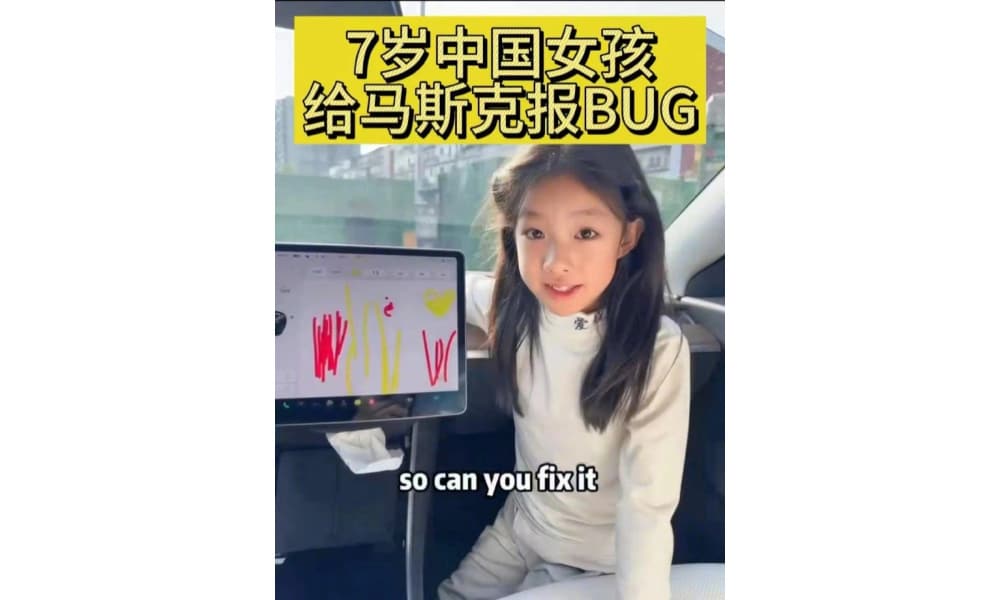
JULY 6
🌊 Dongting Floods | A dike of Dongting Lake in Yueyang, Hunan Province, burst on Friday afternoon, causing serious flooding in the area. What started as a 10-meter-wide breach eventually became a breach of approximately 225 meters (738 feet) wide. This flooding of China’s second-largest freshwater lake has already affected approximately 5,000 people, and around 3,000 people were relocated on Saturday. Efforts to seal the breach in the embankment in Huarong County are underway, with over 4700 people actively helping to control the flood.
JULY 7
📈 Peak in Death Rates | On Sunday, reports of China facing an imminent peak in death rates went trending on Weibo, where a related hashtag became one of the most-searched topics (#中国将迎来人口死亡高峰#). Chinese news outlet Jiemian News reported on a new study published in the latest issue of the Chinese magazine “Population Research” (人口研究), where researchers predict an unprecedented peak in death rates due to various factors, including China’s rapidly aging population, historical birth fluctuations, and increased longevity. As the aging population from the post-war mid-20th-century birth boom leads to a rapid rise in deaths, researchers emphasize the need to prepare for the societal impacts of this peak, including improved palliative care and better planning for funeral services. “Can we first fix the problem of post-graduate unemployment?” one top commenter wondered.
What’s Noteworthy

Do you remember when US Treasury Secretary Yellen had some supposed ‘magic mushrooms’ in Beijing? The mushroom dish she had at a local restaurant is called “jiànshǒuqīng” (见手青) in Chinese; it’s the Lanmaoa asiatica mushroom species that grows in China’s Yunnan region and is considered hallucinogenic if not prepared properly, causing visions that locals call “xiǎorénrén” (小人人), literally meaning seeing “tiny people.” The Chinese is similar to the English term “Lilliputian hallucinations” that refers to visual hallucinations which could also include seeing tiny humans.
The fact that Yellen had this dish actually made it more popular online in China, leading more people to order the mushrooms through online channels.
This week, one Chinese girl named Xiaolin who had ordered 500 grams of the mushrooms became a top trending topic online. She used them for her mushroom soup and added them to her noodles. She consumed all of the mushrooms within one day. Later that night, Xiaolin started feeling unwell. She started seeing numerous “tiny people” running around her house, and when the little figures tried to whisper in her ear and get into her bed, the terrified girl rushed to her friend’s house, who decided to take her to the hospital due to her incoherent speech and strange behavior. The girl was eventually hospitalized due to wild mushroom poisoning.
The story garnered 160 million views on Weibo (#女子吃1斤见手青后看见一屋人#), where many people are now more aware of the dangers of consuming wild mushrooms if not properly cooked. However, there are also many others who are only more curious now; they also want to see ‘little people’ walking around their house.

Meme comparing Vision Pro to the ‘magic’ jianshouqing mushroom: which surreal experience is better?
Some memes relating to this topic suggest that having “jiànshǒuqīng” is a cheaper and more interactive VR experience than getting the Apple Vision Pro. It surely isn’t something that authorities would like to see more people experiment with: a vlogger who tried out some raw mushrooms on her livestream was immediately shut down this week.
What’s Popular

The highly anticipated Chinese film Wild Child (野孩子) was scheduled for a nationwide premiere on July 10. Earlier this year, Wild Child won the Weibo award for the most-anticipated movie of the year. Starring the immensely popular former TFBoys leader Wang Junkai (also known as Karry Wang 王俊凯, 1999), the film had generated significant excitement among Chinese movie-goers. However, this week, the film distributor abruptly announced the cancellation of its release, citing alleged post-production delays. The cancellation, which quickly trended and sparked widespread discussion on Chinese social media, was particularly surprising as tickets were already being sold in the presale box office.
Directed by Yin Ruoxin (殷若昕), Wild Child is based on a true story about two boys from a poor background who struggle to get by. The film addresses the theme of “children living in difficulty” (困境儿童), depicting the lives of children growing up in poverty. The two boys, one a thief and the other an orphan, are united by fate and bond as brothers as they face their challenges together.
Why was the movie canceled so close to its premiere date? Was the withdrawal a purely commercial decision driven by poor presale figures, as suggested in a recent column by People’s Daily, or were there political motivations involved? Could its theme be misaligned with the upcoming Party’s third plenary session? Or is the portrayal of children facing social difficulties simply too sensitive? While the true reasons remain unclear, many fans are hopeful they will still have the opportunity to see the film.
What’s Memorable

For this pick from the archive, and in the context of recent discussions on bystanders not intervening, we revisit a 2015 article about a young Chinese student who helped an elderly lady who had fallen on the street, only to be held liable for her injuries. Stories like these are often cited to explain why people hesitate to help someone in need.
Weibo Word of the Week

“City or not” | Our Weibo phrase of the week is City bu City a (City不City啊), translated as “City or not?”, a phrase that has recently taken the Chinese internet by storm.
The phrase first became popular thanks to American influencer Paul Mike Ashton, nicknamed “Bao Bao Xiong” (保保熊, Baby Bear), who runs a Chinese-language account on Douyin. On his channel, Ashton shares humorous snippets about his life in China, where he works as an entertainer and tour guide.
In one video from April this year, Ashton posted a clip in which he cycles through the city like a Shanghai ‘city girl’ who often mixes Chinese and English words, calling himself “very city” (“我是好city”). He says: “I’m so city, a city girl. It’s so cool, breezy. Life in the city is so good, I feel so free.”
Ashton later began incorporating this phrase more frequently in his videos, often involving his sister, who also speaks Chinese in these humorous exchanges. Walking on the Shanghai Bund, the brother and sister describe Shanghai as “so city” (“好city啊”). While walking on the Great Wall, Bao Bao asks his sister if it’s “city or not” (it’s not).
In other videos in which the two are traveling through China, Ashton repeatedly asks his younger sister if certain things are “city or not,” to which she usually responds humorously: “It’s very city.”
In this context, “city” has evolved from a noun into a quirky adjective, describing something that embodies the essence of urban life; something that is ‘city’ is metropolitan, lively, and modern. It’s very tongue-in-cheek and also serves as a playful commentary on how young Chinese people often mix Chinese and English words to sound more sophisticated and trendy.
This phenomenon sparked the ‘city or not’ meme, which even reached the Foreign Ministry this week when spokesperson Mao Ning was asked about it. She responded that she had heard about the new use of the phrase and that it is a positive sign of foreigners enjoying life in China.
Chinese authorities and state media have also jumped on this trend to promote tourism. By now, the meme has been imitated and adapted by various local tourism departments. Ashton himself has encouraged foreigners to come and experience Chinese culture (and its very ‘city’ city life), further boosting its popularity.
This is an on-site version of the Weibo Watch newsletter by What’s on Weibo. Missed last week’s newsletter? Find it here. If you are already subscribed to What’s on Weibo but are not yet receiving this newsletter in your inbox, please contact us directly to let us know.
China Society
Hero or Zero? China’s Controversial Math Genius Jiang Ping
Humble prodigy or deceptive impostor? Jiang Ping has been fueling online discussions since her remarkable score in the Alibaba maths competition.
Published
3 weeks agoon
July 5, 2024By
Ruixin Zhang
It’s rare for a math competition to become the focus of nationwide attention in China. But since 17-year-old vocational school student Jiang Ping made it to the top 12 among contestants from prestigious universities worldwide, her humble background and outstanding achievement sparked debates and triggered rumors.
About a month ago, nobody had ever heard of Jiang Ping (姜萍). But that all changed in June 2024, when the Alibaba Global Mathematics Competition announced its finalists. Organized by Alibaba’s DAMO Academy in collaboration with the China Association for Science and Technology and the Alibaba Foundation, this competition is open to math enthusiasts worldwide.
This year, among the finalists from top universities around the globe, the 17-year-old Jiang Ping from Jiangsu province stood out. Scoring 93 points and ranking 12th globally, she was not just the only girl in the top 30 but she was also not even a math major—Jiang studies fashion design at a local vocational school. Her remarkable score, combined with her humble background, thrust her into the center of an unexpected public debate.
‘Good Will Hunting’
When the Alibaba Math Competition finalist list was announced in June, Jiang Ping became an instant internet sensation. Her story seemed straight out of an inspiring movie: a poor family, a modest educational background, and exceptional intelligence.
According to her parents and teachers, Jiang Ping had excelled at math since middle school, far surpassing her peers. However, her talent was limited to mathematics, and her weakness in other subjects meant she could only attend a vocational school, and she enrolled at Lianshui Secondary Vocational School, a path often seen as a dead end in China’s competitive educational landscape.
Fate intervened when her math teacher, Wang Runqiu (王闰秋), a master’s graduate from Jiangsu University who never qualified for a PhD program, noticed her extraordinary talent during a monthly math exam. Wang, who also participated in Alibaba’s competition and ranked over 100th, provided Jiang with advanced math textbooks. He believed her potential should not go to waste.
Determined, Jiang Ping self-studied mathematics alongside her fashion design curriculum, even using an English-Chinese dictionary to understand partial differential equations textbooks in English. When Jiang heard that Alibaba’s competition had no educational requirements, she seized the opportunity, and her talent finally came to light.
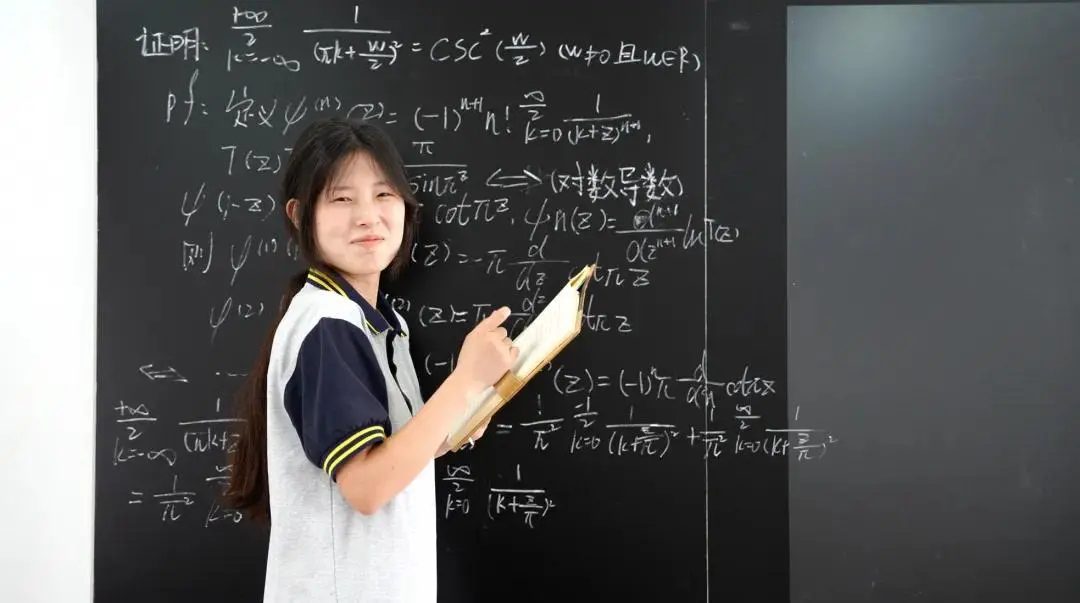
Jiang Ping, image via iFeng News.
The public initially seemed to love the story of a small-town Chinese girl experiencing a miraculous turning point in her life. Her 70-year-old father could hardly earn more than a few hundred yuan a month, and she often worked during holidays to help support her family.
According to Xinjing News, by March 2024, her family had applied for a subsistence allowance but had yet to receive it. After Jiang Ping’s story went viral, the allowance was immediately secured. Her village and school became new hotspots for influencers. Vloggers flocked to her home to film TikTok videos, and even tourists from other provinces visited Lianshui County just to take photos at Jiang’s school.
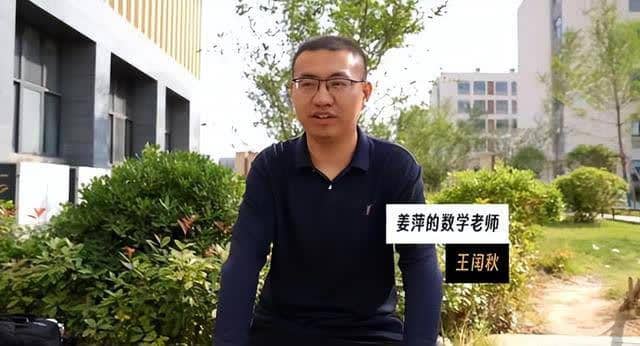
Wang Runqiu, Jiang Ping’s teacher
Everything seemed to be going well. Education blogger Luo Miao (@罗淼_吐槽用) posted that Jiang Ping and her teacher Wang Runqiu had achieved something more miraculous than the story portrayed in the American movie “Good Will Hunting,” which is also about a self-taught mathematical genius. However, the real world is not a movie. This celebration took a downturn in less than five days.
A Questionable Math Problem
Shortly after the finalists were announced and Jiang Ping’s name spread across social media, online discussions questioning her mathematical abilities began to emerge on forums like Zhihu. The focal point of these discussions was a scene from an official Alibaba video where Jiang Ping is seen holding scratch paper and solving a math problem on a blackboard.
On June 18, a WeChat post by renowned math competition coach Zhao Bin (赵斌) was trending on Weibo. Zhao, who had participated in the Alibaba competition three times and made it to the finals each time, asserted that Jiang Ping’s advancement to the finals was 99.99% likely fabricated. He raised doubts about Jiang Ping’s solution process on the blackboard, pointing out issues like “the domain of definition was incorrect” and “the differentiation symbol is written in the wrong place.” He concluded that Jiang was not familiar with these math questions and may have simply copied the answers from her scratch paper.
Zhao Bin further suggested that this might be orchestrated by Jiang Ping’s teacher Wang Runqiu, who probably wanted to hype up Jiang Ping’s image as an unrecognized genius and his own image as a mentor. Zhao also stated that if he was wrong, Jiang Ping truly was a math prodigy and that if she would make it to university, he would personally finance her tuition fees.
On June 19, 39 contestants from the Alibaba competition released a petition to the organizing committee. Besides the problems addressed by Zhao, they mentioned another point of contention: a teacher who had seen Jiang Ping’s exam paper commented that she exhibited “proficient use of LaTeX” while answering questions. LaTeX, a typesetting system for scientific documents, is highly sensitive to writing errors, which contradicts the frequent errors in Jiang Ping’s handwriting in the video.
This was also mentioned by Peking University professor Yuan Xinyi (袁新意) in a lengthy analysis on Zhihu, where he argued that as a vocational school student, Jiang Ping couldn’t possibly be proficient in using LaTeX. In their petition, the 39 contestants put forth specific demands, including the public release of Jiang Ping’s answer sheets for review by all finalists and a request for an independent third-party investigation.
Of course, there are those who choose to believe in Jiang Ping. Science fiction writer Bei Xing (@北星微博) made meticulous notes and explanations of Jiang Ping’s problem-solving process on the blackboard. He concluded that it was impossible to have such a clear approach if she had just copied someone else’s answers, as Zhao assumed. It was also understandable for a 17-year-old who had almost entirely self-taught herself to make some writing errors and formatting irregularities.
Up until this point, most discussions were still about academic integrity. But the fact that Alibaba and Damo Academy did not directly address these doubts only triggered more rumors. Many influencers with large followings, despite lacking a math background, also started to chime in with comments like “Jiang Ping doesn’t even recognize mathematical symbols,” leading to another surge of speculation and defamation directed at Jiang Ping.
Online Chaos
On June 23rd, the Weibo user ‘Oxford Kate Zhu Zhu’ (@牛津Kate朱朱), a mathematics PhD candidate at Oxford University, posted on Weibo that she had faced significant online abuse after expressing support for Jiang Ping. She said that she has sought legal assistance to deal with the online attacks. This post, which quickly went viral, showed how the controversy surrounding Jiang Ping has gone beyond mathematics or academic integrity.
By June 20th, Jiang Ping herself had already been doxxed. Someone posted her personal information online, including photos of her ID card. This practice is referred to as “opening the box” (开盒) on the Chinese internet. Netizens on platforms like Zhihu and Hupu began spreading rumors about Jiang Ping and her relationship with her mathematics teacher, with so-called “informants” even coming forward to allegedly confirm their “improper relationship.” Subsequently, a screenshot of Jiang Ping’s previous math exam score, showing she had scored only 83 points, was also leaked.
Professor of Criminal Law at Tsinghua University Lao Dongyan (@劳东燕2004) expressed concern about this situation, posting on Weibo to remind netizens that while people have the right to question Jiang Ping’s remarkable results, they should not throw around baseless accusations and push the debate in a direction that borders on defamation.
However, many people continue to see Jiang Ping’s amicable relationship with her teacher and her former 83-point exam score as justification to spread her private photos, transcripts, and even monthly exam papers on the Internet.
By now, the situation has become so messy that the Education Bureau of Lianshui County had to step in and set the record sraight on some trivial matters, such as the authenticity of Jiang’s monthly exam score and whether some teacher had bought her snacks or not.
Wang Hongqin vs Jiang Ping
Amidst the chaos, voices of reason remain: some netizens have expressed disappointment at Alibaba’s continued silence. They suggest that regardless of how Jiang Ping made it to the math competition finals, as an underage girl, she should not be thrust into the eye of the hurricane.
Meanwhile, another story has drawn parallels to Jiang’s situation. Recently, some netizens discovered that the son of the famous Chinese actress Wang Yan (王艳), Wang Hongqin (王泓钦), was admitted to Peking University as a “high-level athlete” based on his basketball talent. However, there are publicly available records indicating that his athletic achievements were not that impressive at all.
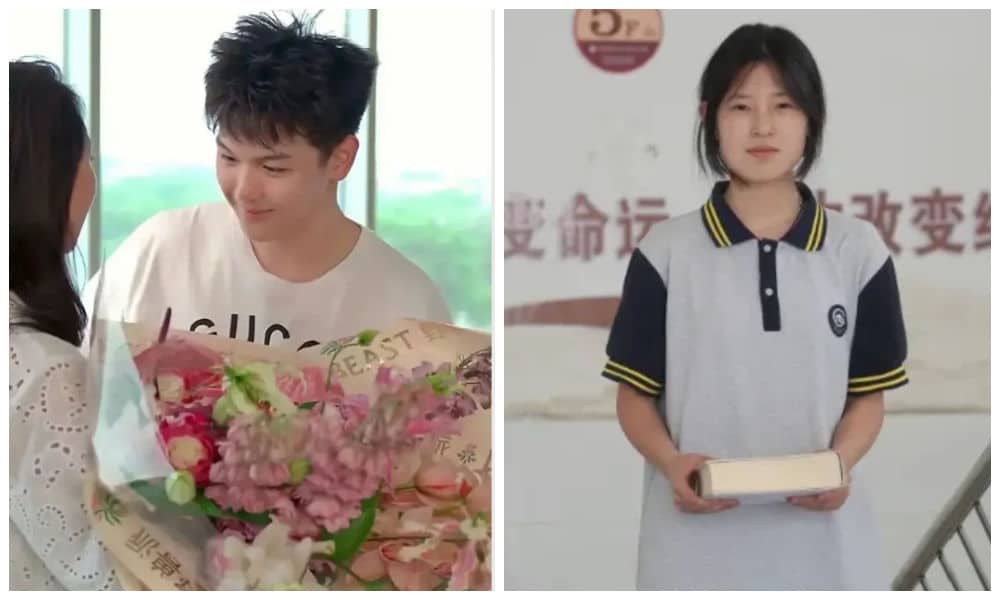
Wang Hongqin and Jiang Ping
This raised many discussions on Chinese social media. Netizens questioned why Jiang Ping, with her outstanding math achievements, wasn’t celebrated in the same way as Wang Hongqin. Others highlighted the disparity in opportunities for talented student from different backgrounds.
There were also questions about why Jiang Ping was receiving so much online hate, while Wang Hongqin did not. Under a Weibo post discussing Wang Yan’s son’s admission to Peking University, one comment explained public reasoning: “Wang Yan has access to high-level resources that are out of reach for ordinary people. In contrast, Jiang Ping is seen differently. When someone tries to break through societal layers [like that], they are dragged out and “paraded” through the streets.”
The discussions on the different public reactions to Wang Hongqin and Jiang Ping relate to a time of social insecurity when people face a competitive education system and a worsening job market. In this context, they are less likely to relate to “zero to hero” stories.
When someone with a low educational background achieves success, they are now often seen as cheaters rather than being celebrated. While people often feel powerless to challenge the privileges of the elite, the sudden rise of a vocational school student like Jiang Ping intensifies feelings of deprivation and being bypassed. Even though Jiang might have reached the finals through her own mathematical talent, there is still a lot of resentment towards the 17-year-old rural girl, who lacks background and connections. This misplaced anger is a reflection of deeper societal issues and inequalities.
Despite being at the center of the battlefield of public opinions, Jiang Ping has not made any statement yet. On June 22nd, she participated in Alibaba’s math competition finals, and perhaps now—as in every summer before—she is preparing to find a part-time job to support her family. The outcome of the finals will be announced in August, so Jiang Ping’s story will undoubtedly be continued.
By Ruixin Zhang
edited for clarity by Manya Koetse
Independently reporting China trends for over a decade. Like what we do? Support us and get the story behind the hashtag by subscribing:
Spotted a mistake or want to add something? Please let us know in comments below or email us. First-time commenters, please be patient – we will have to manually approve your comment before it appears.
©2024 Whatsonweibo. All rights reserved. Do not reproduce our content without permission – you can contact us at info@whatsonweibo.com.
Subscribe

Weibo Watch: The Future is Here

“Bye Bye Biden”: Biden’s Many Nicknames in Chinese

Enjoying the ‘Sea’ in Beijing’s Ditan Park

A Triumph for “Comrade Trump”: Chinese Social Media Reactions to Trump Rally Shooting

Weibo Watch: Get Up, Stand Up

The Tragic Story of “Fat Cat”: How a Chinese Gamer’s Suicide Went Viral

“Old Bull Eating Young Grass”: 86-Year-Old Chinese Painter Fan Zeng Marries 36-Year-Old Xu Meng

A Brew of Controversy: Lu Xun and LELECHA’s ‘Smoky’ Oolong Tea

Singing Competition or Patriotic Fight? Hunan TV’s ‘Singer 2024’ Stirs Nationalistic Sentiments

Zara Dress Goes Viral in China for Resemblance to Haidilao Apron

Weibo Watch: The Battle for the Bottom Bed

About the “AI Chatbot Based on Xi Jinping” Story

China’s Intensified Social Media Propaganda: “Taiwan Must Return to Motherland”

Weibo Watch: Telling China’s Stories Wrong

Saying Goodbye to “Uncle Wang”: Wang Wenbin Becomes Chinese Ambassador to Cambodia
Get in touch
Would you like to become a contributor, or do you have any tips or suggestions? Get in touch here!
Popular Reads
-

 China Insight3 months ago
China Insight3 months agoThe Tragic Story of “Fat Cat”: How a Chinese Gamer’s Suicide Went Viral
-

 China Music4 months ago
China Music4 months agoThe Chinese Viral TikTok Song Explained (No, It’s Not About Samsung)
-

 China Digital10 months ago
China Digital10 months agoToo Sexy for Weibo? Online Discussions on the Concept of ‘Cābiān’
-

 China Arts & Entertainment12 months ago
China Arts & Entertainment12 months agoBehind 8 Billion Streams: Who is Dao Lang Cursing in the Chinese Hit Song ‘Luocha Kingdom’?




